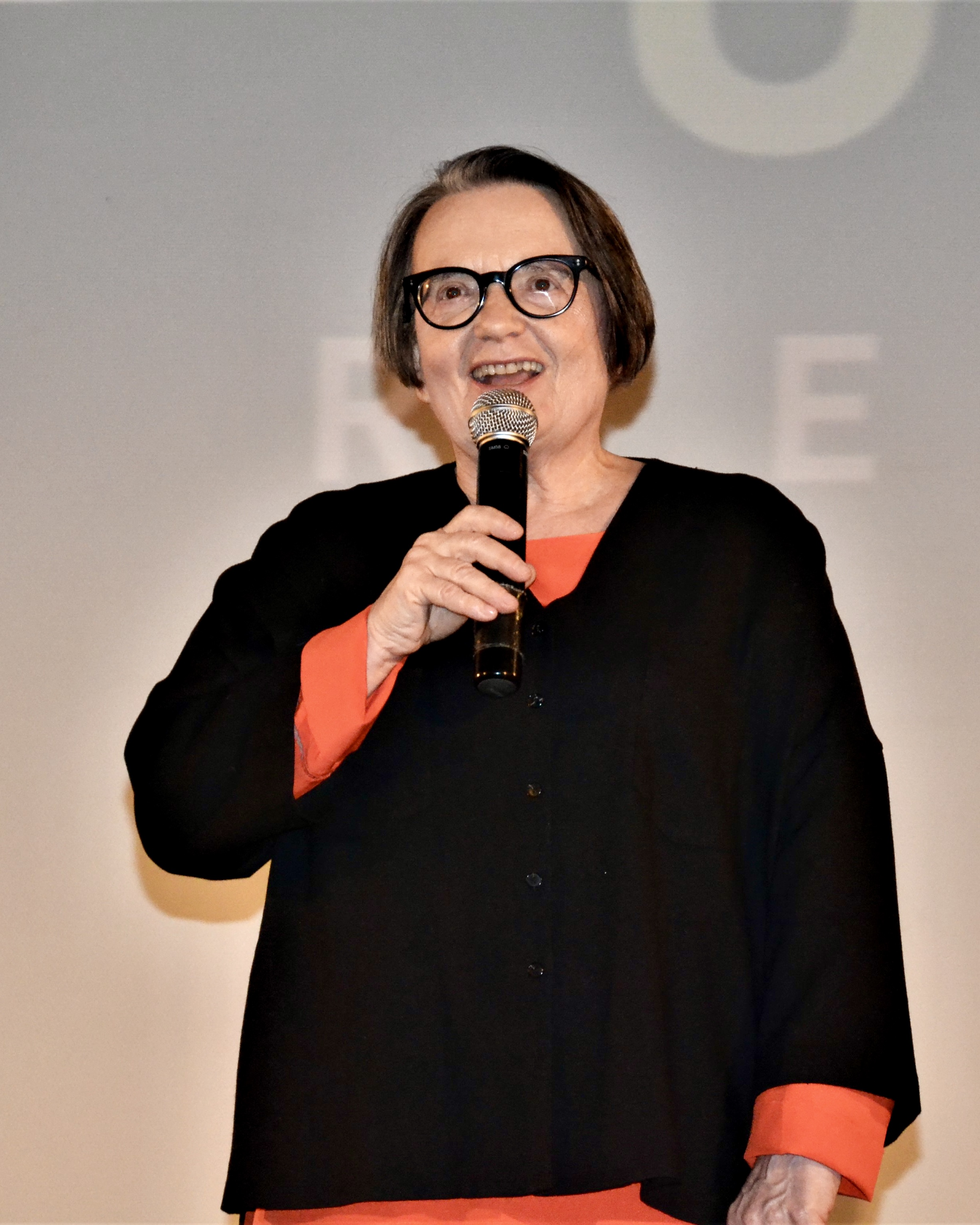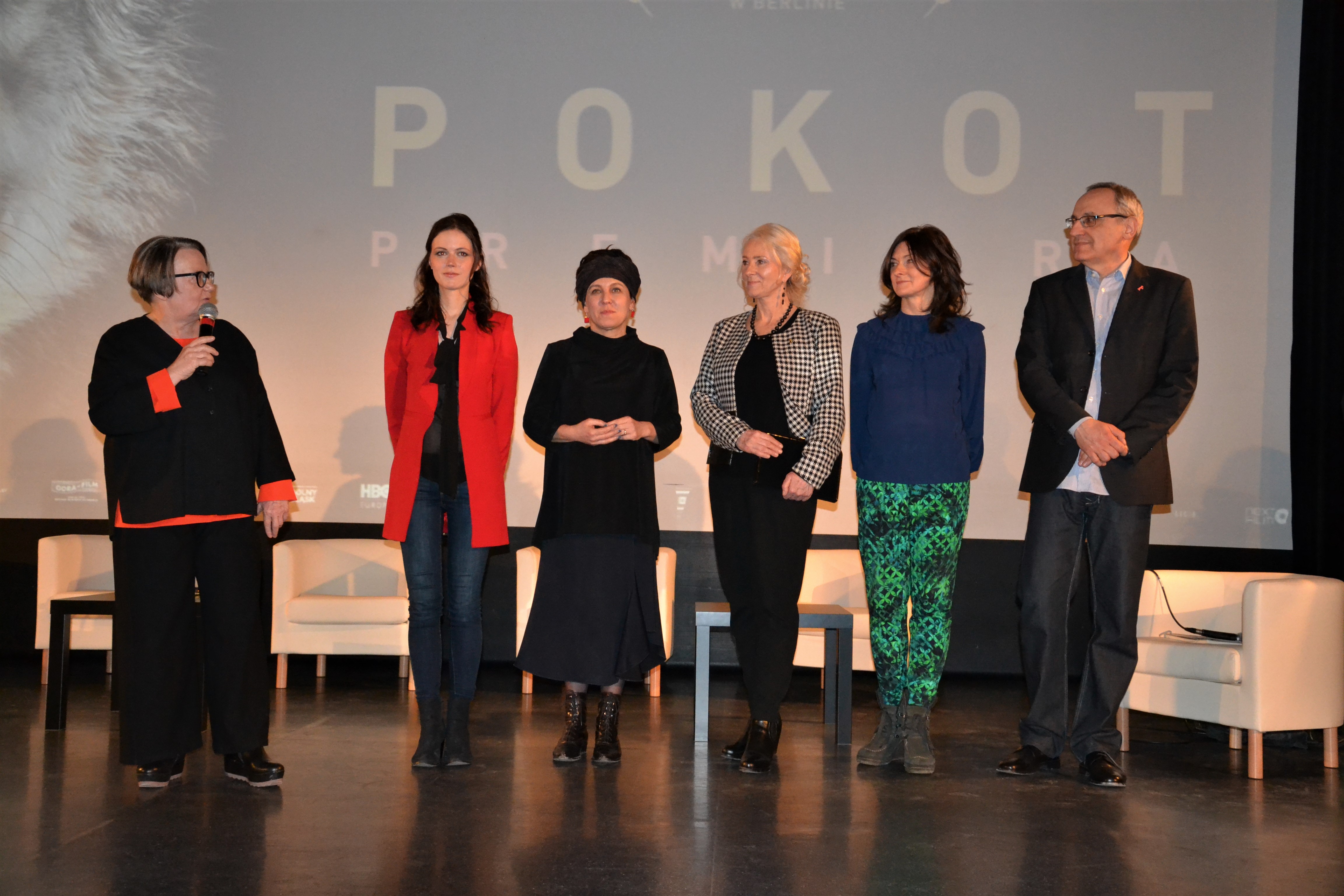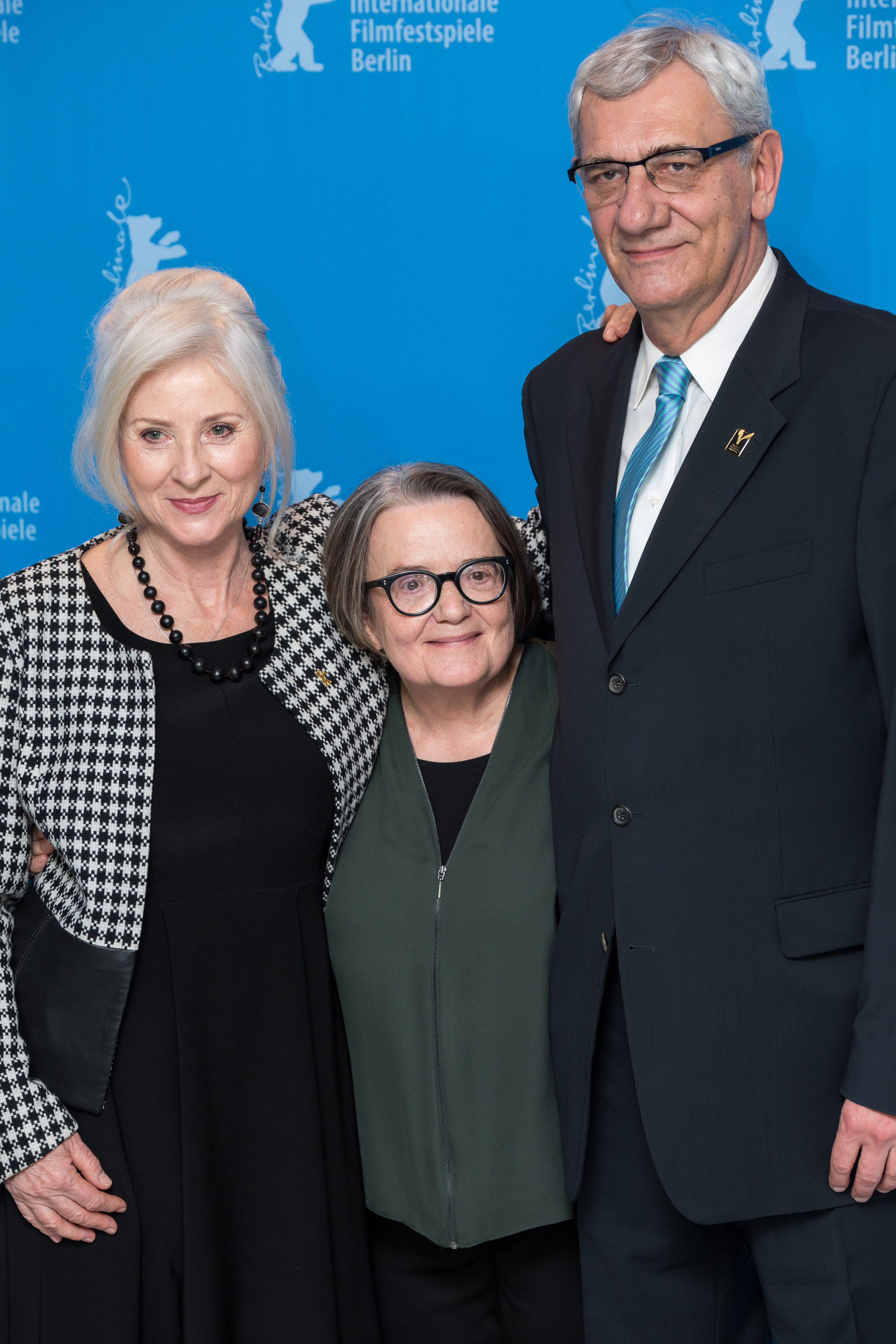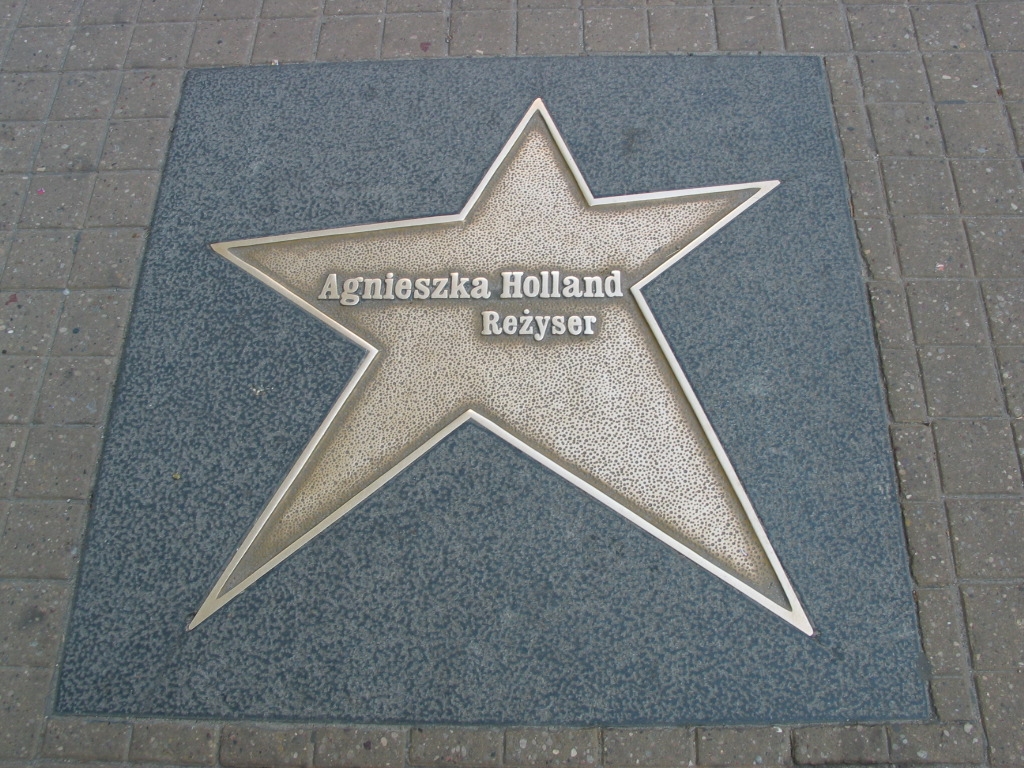1. Overview
Agnieszka Holland (Agnieszka HollandAgnieszka Ho-lantPolish; born 28 November 1948) is a highly influential Polish film and television director and screenwriter, renowned for her significant contributions to Polish and international cinema. Her career began as an assistant to notable Polish directors Krzysztof Zanussi and Andrzej Wajda. Holland gained international recognition for films such as Europa Europa (1990), Angry Harvest (1985), and In Darkness (2011), all of which garnered prestigious awards and nominations, including for the Academy Awards and Golden Globe Awards.
Holland's work is characterized by a profound engagement with political and social issues, often focusing on the individual experiences of people marginalized by historical events. A recurring theme in her films is the critical examination of totalitarian regimes, particularly Nazi and communist crimes, and their impact on human lives. She explores complex themes of identity, human resilience, and social injustice, frequently drawing from her own background and experiences. Beyond directing, Holland has held significant leadership roles, serving as President of the European Film Academy. She has received numerous accolades for her artistic vision and moral clarity, including the Alfred Bauer Prize and the Special Jury Prize at the Venice International Film Festival for her controversial 2023 film Green Border.
2. Early Life and Education
Agnieszka Holland's early life was shaped by her family's complex history and the turbulent political landscape of post-war Poland, profoundly influencing her artistic and thematic concerns.
2.1. Childhood and Family Background
Holland was born in Warsaw, Poland, in 1948. She is the daughter of journalists Irena (née Rybczyńska) and Henryk Holland. Her father, Henryk Holland, was a prominent Communist activist since 1935 and served as a captain in the Soviet Army. He was Jewish, having lost his parents in a ghetto during the Holocaust, and spent most of his adult life denying his Jewish heritage. Henryk Holland's publications, which criticized a number of prominent professors, led to their dismissals by the Communist regime.
Holland's mother, Irena Rybczyńska, was Roman Catholic and participated in the 1944 Warsaw Uprising as a member of the Polish resistance movement. She notably aided several Jews during the Holocaust and was later awarded the Righteous Among the Nations medal by the Yad Vashem Institute in Israel. Agnieszka Holland was not brought up in either faith.
As a child, Holland was often ill and spent much of her time writing, drawing, and directing short plays with other children. When she was eleven, her parents, whose marriage was continuously contentious, divorced. Her mother soon remarried Stanisław Brodski, a Jewish journalist. Holland described her relationship with her father as influential but very distant, recalling being shown off to his friends during late-night gatherings only to be ignored in the morning. When she was thirteen, her father died by suicide while under house arrest in Warsaw.
The events and confusing identities that defined her childhood resulted in Holland's significant struggle with identity, a theme that manifests in many of her most famous films, particularly those related to Polish-Jewish interactions during the Holocaust. Holland has observed that the tense relationship between ethnic Jews and Poles remains an ongoing issue, stating that "Jews from Poland are still hostile to the Polish...There are things in Catholicism and Polish nationalism which are deeply anti-Semitic." These personal conflicts and hardships have served as inspiration for films such as Europa Europa and In Darkness.
2.2. Education and Political Awakening
Holland attended the Stefan Batory Gymnasium and Lyceum in Warsaw. After high school, she pursued film studies at the Film and TV School of the Academy of Performing Arts in Prague (FAMU) in Prague, Czechoslovakia. She chose FAMU because she found the Czechoslovak films of the 1960s, including works by Miloš Forman, Ivan Passer, and Věra Chytilová, "fantastically interesting" and unlike anything being made in Poland at the time.
While in Czechoslovakia, Holland witnessed the Prague Spring of 1968 and was subsequently arrested for her support of the dissident movement advocating for government reforms and political liberalization. She described her time in Prague as her "introduction to politics, violence, beauty, art, marriage, film and other arts...everything that happened to [her] after was based on this Czechoslovak experience." During her imprisonment, she was tasked with passing erotic notes between two inmates who had fallen in love, an experience she likened to being "the cable" in "phone sex." This period in Prague and in prison led her to realize she "rather be an artist than an agitator."
Holland graduated from FAMU in 1971 and returned to Poland. Her first screenplay was censored and prevented from being developed, but it attracted the attention of Andrzej Wajda, who became her mentor. While at FAMU, she also met her future husband and fellow director, Laco Adamik. Their daughter, Kasia Adamik (born 28 December 1972), also became a director.
3. Career in Poland
Agnieszka Holland's early career in Poland was marked by significant mentorship, a distinctive directorial debut, and the challenges posed by the communist regime's censorship, which ultimately led to her exile.
3.1. Early Career and Mentorship
Holland began her professional career as an assistant director for two of Poland's most renowned filmmakers, Krzysztof Zanussi and Andrzej Wajda. Her early credits include assisting on Zanussi's 1973 film Iluminacja (Illumination). She also served as first assistant director on Wajda's 1976 film Man of Marble. This experience was particularly formative, providing her with the opportunity to explore complex political and moral issues within the confines of an oppressive regime. Despite her substantial role in the film's success, her name was omitted from the credits due to the prevailing censorship laws. During this initial phase of her career, Holland was unable to release films under her own name due to Communist censorship. Wajda, recognizing her talent, even offered to formally adopt her to bypass these restrictions, but she declined, confident that she would eventually be able to direct films under her own name.
3.2. Debut and Censorship
Holland's directorial debut was Provincial Actors (Aktorzy prowincjonalniPolish), released in 1978. This film chronicled the tense backstage relations within a small-town theater company, serving as an allegory for Poland's contemporary political situation under communist rule. The film gained international recognition, winning the International Critics Prize at the 1980 Cannes Film Festival. Following this success, she directed two more notable films in Poland: Fever (GorączkaPolish, 1980), which was entered into the 31st Berlin International Film Festival, and A Lonely Woman (Kobieta samotnaPolish, 1981).
3.3. Exile
Holland immigrated to France shortly before the imposition of martial law in Poland in December 1981. This move was not voluntary; she was informed that she could not return to Poland, a situation that also meant she was unable to see or have any contact with her daughter for over eight months. Although safe in exile, this period presented significant challenges, making it difficult for her to create successful films independently.
4. International Career and Thematic Focus
Holland's international career has been marked by a consistent focus on historical and political themes, often exploring the complexities of identity and human resilience in the face of oppression.
4.1. Holocaust and Historical Themes
Some of Holland's most acclaimed works are her depictions of the Holocaust and other historical events. These films are characterized by a commitment to realism and a nuanced portrayal of individuals, acknowledging both their victimhood and their human flaws. Her films in this genre "cling to the world as she sees it. A world in which wisdom, if it exists at all, lies in accepting the violence and human frailty in everyone, without exception, including Jewish people."
Her 1985 West German production, Angry Harvest (Bittere ErnteGerman), a film about a Jewish woman on the run during World War II, earned her an Academy Award nomination for Best Foreign Language Film.
Holland's best-known film, Europa Europa (1990), is based on the true story of Solomon Perel, a Jewish teenager who fled Germany for Poland after Kristallnacht in 1938. During the German invasion of Poland, Perel escaped to the Soviet-occupied zone, but was later captured during the 1941 German invasion of the USSR. He convinced a German officer he was German and was subsequently enrolled in the Hitler Youth. The film received a lukewarm reception in Germany and was not submitted for the 1991 Best Foreign Language Film Oscar by the German selection committee. However, it gained significant attention in the United States, winning the 1991 Golden Globe Award for Best Foreign Language Film and an Academy Award for Best Adapted Screenplay nomination.

Nearly two decades later, Holland released In Darkness (2011), a German-Canadian-Polish co-production. This film dramatizes the true story of Leopold Socha, a Polish sewage worker who aided a group of Jewish refugees by hiding them in the sewers of Lwów as Jewish people in the city were being sent to extermination camps. The narrative highlights the relationships between ethnic Poles and Jewish people during the Holocaust, showcasing strong similarities between characters despite their vastly different realities. By juxtaposing Polish and Jewish protagonists, Holland recreates the morally ambiguous and brutal world prevalent during the Third Reich. This portrayal reflects Holland's personal struggle with identity and anti-Semitism. The film was selected as the Polish entry for the Best Foreign Language Film at the 84th Academy Awards, becoming one of the five nominees.
In 2019, her historical film Mr. Jones, which addresses the Great Famine in Ukraine, won the Golden Lions Award (Złote LwyPolish) at the Gdynia Film Festival. For their efforts in promoting the memory of the Holodomor, Holland and Anne Applebaum were awarded the Order of Princess Olga, 3rd Class, by Ukrainian President Volodymyr Zelensky on 23 November 2019.
4.2. Political and Social Critique
Much of Holland's filmography carries a strong political slant, consistently critiquing authoritarian regimes and social injustices. Her early works frequently depicted government reprisals, stifling bureaucratic machinery, sanctioned strikes, and dysfunctional families under the Communist regime. In a 1988 interview, Holland stated that while women were important in her films, feminism was not the central theme. She emphasized the atmosphere of cross-gender solidarity against censorship, which was the primary political issue in Poland at the time. Holland asserted her interest in the interactions between people, rather than external politics, concluding that "maybe you could say that all my movies are political."


In February 2017, Holland received the Alfred Bauer Prize (Silver Bear) at the Berlin International Film Festival for her film Spoor (PokotPolish). This award recognizes films that open new perspectives in the art of cinema.
Her 2023 film, Green Border, portrays the severe plight of migrants caught in the Belarus-European Union border crisis. The film premiered at the 80th Venice International Film Festival and was awarded the Special Jury Prize. Green Border sparked considerable controversy and faced strong criticism from Polish government officials, who accused Holland of presenting a negative image of Polish border guards abroad. In response, European directors defended the film, supporting Holland's artistic freedom and her focus on human rights.
4.3. Artistic Vision and Identity
Holland often focuses on the individual experiences of people who find themselves on the sidelines of political events. Her thematic interests include human resilience and the complexities of identity, frequently drawing from her personal background and experiences. She has noted that filmmakers of the younger generation sometimes "lack life experience," which she believes deprives them of the tools needed to infuse humanity into their characters. She suggests that many contemporary directors, coming from affluent backgrounds and primarily consuming films on video, contribute to a "numbness" and "conventionalization" in modern cinema. Holland's deeply personal struggles with her mixed Polish Catholic and Jewish ancestry and the historical conflicts between these groups have profoundly shaped her artistic output, particularly in films like Europa Europa and In Darkness, where she explores the difficult and often morally ambiguous interactions during times of crisis.
5. Hollywood and Television Work
Holland successfully transitioned to international filmmaking, directing major productions in Hollywood and contributing significantly to acclaimed television series.
5.1. Transition to Hollywood and Major International Films
Holland's breakthrough in Hollywood came after the success of her 1990 film Europa Europa. Her entry into American filmmaking was notably facilitated by producer Artur Brauner. After a difficult production experience with Angry Harvest, Holland had considered abandoning filmmaking, but Brauner convinced her to take on Europa Europa. A memorable anecdote recounts Brauner presenting her with a contract for the film immediately after a roller coaster ride at Disneyland, where Holland, despite her fear, signed.
The success of Europa Europa brought Holland to the attention of mainstream Hollywood, leading to her opportunity to direct the film adaptation of the 1911 novel The Secret Garden (1993). This marked a significant stylistic shift for Holland, who was previously known for her generally dark and pessimistic directorial perspective, as this was her first film made for a major studio with a broad American audience in mind.
Her later feature films include Olivier, Olivier (1992), Total Eclipse (1995), Washington Square (1997), The Third Miracle (1999), Shot in the Heart (2001), Julie Walking Home (2002), and Copying Beethoven (2006). As of March 2024, Holland is in pre-production for a Franz Kafka biopic titled Franz. In March 2016, it was also announced that she was set to direct an adaptation of Peter Swanson's novel The Kind Worth Killing, a psychological thriller.
5.2. Television Directing
Holland has made significant contributions to television, directing episodes for several critically acclaimed series. For the HBO drama series The Wire, she directed "Moral Midgetry" (Season 3, Episode 8) in 2004 and "Corner Boys" (Season 4, Episode 8) in 2006, both written by Richard Price. She also directed "React Quotes" (Season 5, Episode 5) in 2008. Showrunner David Simon praised Holland as "wonderful behind the camera," noting her effective staging of a fight scene in "Moral Midgetry."
In 2007, Holland, along with her sister Magdalena Łazarkiewicz and daughter Kasia Adamik, directed the Polish political drama series Ekipa. She directed the three-part HBO miniseries Burning Bush (2013), which dramatized the self-immolation of Jan Palach in January 1969 as a protest against the "normalization" following the Warsaw Pact invasion of Czechoslovakia in August 1968. The miniseries was screened at the 2013 Toronto International Film Festival and earned Holland the Czech Lion Award in the Best Director category. In December 2013, Holland was announced as the director for NBC's two-part miniseries Rosemary's Baby, an adaptation of Ira Levin's novel starring Zoe Saldana. Her television directing credits also include episodes for The Killing (2011-2012), Treme (2010-2013), House of Cards (2015, 2017), The Affair (2015), and The First (2018).
6. Leadership and Recognition
Agnieszka Holland has received extensive recognition for her cinematic achievements and has taken on significant leadership roles within the film industry.
6.1. Presidency of the European Film Academy
In January 2014, Holland assumed the chairmanship of the European Film Academy board. In 2020, she was elected President of the European Film Academy, a significant leadership position in European cinema.
6.2. Awards and Honors
Holland has been nominated for three Academy Awards: Best Adapted Screenplay for Europa Europa (1990), and Best Foreign Language Film for Angry Harvest (1985) and In Darkness (2011). She won the Golden Globe Award for Best Foreign Language Film for Europa Europa in 1991. At the Cannes Film Festival, her film Provincial Actors received the International Critics Prize in 1980. She is a four-time winner of the Grand Prix at the Gdynia Film Festival, including the Golden Lions Award in 2019 for Mr. Jones.
In February 2017, she was awarded the Alfred Bauer Prize (Silver Bear) at the Berlin International Film Festival for her film Spoor, recognizing its innovative perspective in film art. For her television work, she won the Czech Lion Award in the Best Director category for the miniseries Burning Bush. In 2020, she was honored with the FIPRESCI Platinum Award at the Sofia International Film Festival. Her 2023 film Green Border received the Special Jury Prize at the Venice International Film Festival.

On 24 October 2023, the Los Angeles Film Critics Association presented Holland with their Career Achievement Award, commending her work for its "moral clarity, deep empathy and invigorating filmmaking," which "lays bare the damage that oppressive regimes and sociopolitical conflicts wreak on everyday souls." She received an honorary doctorate from the National Film School in Łódź on 12 October 2023. On 28 October 2024, Holland was awarded the Medal of Merit from Czech President Petr Pavel for her cultural impact. In July 2024, she was announced as a jury member at the 81st Venice International Film Festival.
7. Personal Life
7.1. Family and Relationships
Agnieszka Holland was married to fellow director Laco Adamik, whom she met while studying at FAMU in Prague. Their daughter, Kasia Adamik (born 28 December 1972), has also followed in her parents' footsteps as a film director. Her parents were Irena Rybczyńska and Henryk Holland. Following her parents' divorce when she was eleven, her mother remarried Stanisław Brodski.
8. Filmography
8.1. Directed Works
- Jesus Christ's Sin (Grzech BogaPolish, 1970)
- Evening at Abdon's (Wieczór u AbdonaPolish, 1975)
- Pictures from Life: A Girl and Aquarius (Obrazki z życia: dziewczyna i "Akwarius"Polish, 1975)
- Screen tests (Zdjęcia próbnePolish, 1976)
- Sunday Children (Niedzielne dzieciPolish, 1977)
- Something for something (Coś za cośPolish, TV movie, 1977)
- Provincial Actors (Aktorzy prowincjonalniPolish, 1979)
- Fever (GorączkaPolish, 1980)
- A Lonely Woman (Kobieta samotnaPolish, 1981)
- Postcards from Paris (TV film, 1982)
- Interrogation (1982)
- Culture (documentary, 1985)
- Angry Harvest (Bittere ErnteGerman, 1985)
- To Kill a Priest (1988)
- Europa Europa (1990)
- Olivier, Olivier (1992)
- The Secret Garden (1993)
- Red Wind (TV movie, 1994)
- Total Eclipse (1995)
- Washington Square (1997)
- The Third Miracle (1999)
- Shot in the Heart (2001)
- Golden Dreams (documentary, 2001)
- Julie Walking Home (2002)
- Cold Case (2004) - TV series episode
- Copying Beethoven (2006)
- A Girl Like Me: The Gwen Araujo Story (2006) - TV movie
- Ekipa (2007) - TV series
- Janosik: A True Story (Prawdziwa historiaPolish, 2009)
- In Darkness (2011)
- Burning Bush (2013) - miniseries
- Rosemary's Baby (2014) - miniseries
- Spoor (2017)
- The First (2018) - TV series episodes
- Mr. Jones (2019)
- Charlatan (2020)
- Green Border (2023)
- Franz (2025) - pre-production
- Television Series Episodes:**
- "Moral Midgetry" (2004)
- "Corner Boys" (2006)
- "React Quotes" (2008)
- "Do You Know What It Means" (2010)
- "I'll Fly Away" (2010)
- "That's What Lovers Do" (2011)
- "...To Miss New Orleans" (2013)
- "What You Have Left" (2011)
- "Undertow" (2011)
- "Reflections" (2012)
- "Chapter 36" (2015)
- "Chapter 37" (2015)
- "Chapter 62" (2017)
- Episode 3.6 (2015)
9. Other Work
9.1. Literary Translation and Appearances
Agnieszka Holland has contributed to the arts beyond directing. She translated Milan Kundera's novel The Unbearable Lightness of Being from Czech to Polish. She volunteered for this task after meeting Kundera in 1982 in Paris and reading his manuscript. Holland found the book's events relatable to her personal experience of the Warsaw Pact invasion of Czechoslovakia and the 1980 strikes in Poland, motivating her to introduce the work to a Polish audience. The translation was initially published by the London-based publisher Aneks and has since been widely reprinted.
In 2003, Holland served as a member of the jury at the 25th Moscow International Film Festival. On 1 December 2013, she was invited to deliver the Rajiv Vaidya Memorial Lecture, "Viewing History through the Filmmaker's Lens," at the National Gallery of Art in Washington, D.C., where her film Burning Bush was also screened. She was also a guest speaker at Brooklyn College. In 2023, Holland appeared as a guest star in the Polish Netflix series Absolute Beginners. In July 2024, she was announced as a jury member at the 81st Venice International Film Festival.